Apr 11, 2017
Raptors made the best of Lowry's injury
Not too long ago, finding even a single silver lining in Kyle Lowry's injury and lengthy absence from the Raptors lineup would have been a challenge. But looking back on it, there are some positives to take away.
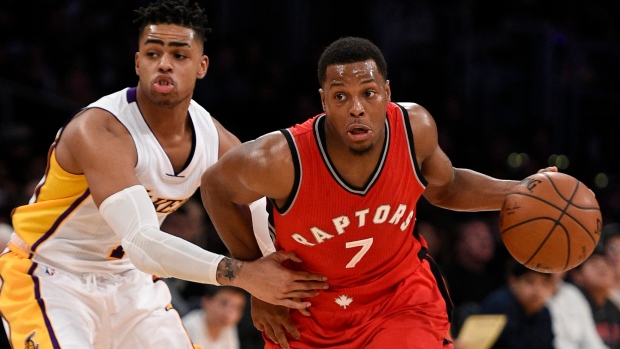
Not too long ago, finding even a single silver lining in Kyle Lowry's injury and lengthy absence from the Raptors lineup would have been a challenge.
When Toronto's All-Star point guard underwent surgery on his shooting wrist in late February, most saw it for what is was: an already slumping team losing its best and most indispensable player. Generally, there's very little good that can come of that, or so we thought at the time.
Now that he's returned – and especially after they were able to hold down the fort without him, going 14-7 – it's easier to appreciate some of those positive "residual effects," as Dwane Casey calls them. Some are harder to see, some may have more of an immediate impact than others, but the Raptors – and even Lowry himself – should be better off in both the short and long term as a result of the injury. In many ways, and for a number of people, it turned out to be a blessing in disguise.
DELON WRIGHT
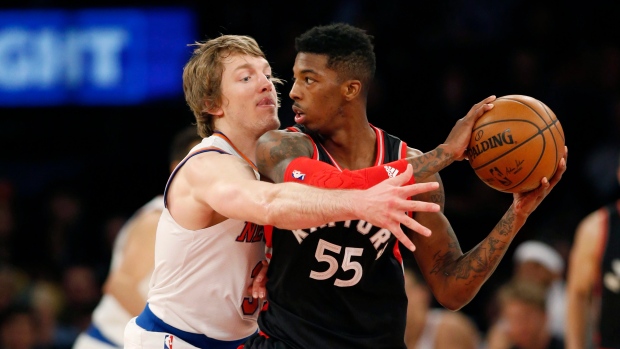
With Lowry sidelined, Wright was asked to play regular rotation minutes for the first time in his young career and the sophomore point guard did not look out of place. Sure, he made his share of mistakes and had the occasional off night, like any other inexperienced player, but one of the biggest takeaways from his 21-game audition was how quickly he bounced back from them.
At 24, Wright is one of the league's older prospects, which is something the Raptors have always liked about him. His maturity came through on the court.
His fit with the second unit was seamless thanks in large part to the qualities he shares with the man he was replacing, Cory Joseph. He's a crafty ball handler that pushes the tempo, changes speeds and gets to the rim with ease but, also like Joseph, he excels on the defensive end. A big point guard at 6-foot-5, Wright uses his length to disrupt shooters, jump passing lanes and even block unsuspecting victims.
Buried behind Lowry and Joseph on the depth chart, Wright bounced back and forth from the D-League as a rookie. This year, he didn't even get into a game until mid-February after missing the first half of the campaign recovering from off-season shoulder surgery. Despite his strong play with the 905, nothing simulates NBA competition quite like NBA competition. In just over a month, he logged 364 minutes, nearly 100 more than he played in the season and a half that preceded it.
Although he wasn't the only one to thrive in an expanded role, no one benefited from the experience more. With Lowry back, Wright returns to the bench. But, in the event the Raptors need a spark come playoff time, Casey has enough confidence in his third-string point guard to throw him out there, something that couldn't be said two months ago.
Presumably, Casey and the Raptors weren't the only ones that noticed Wright's fine work. Assuming Lowry re-signs in Toronto this summer – and the expectation is that he will – Wright's emergence and rising value should give Masai Ujiri some interesting options, whether they look to move him or move Joseph or explore creative ways to play all three. Regardless of how it shakes out, the experience he gained is invaluable both to Wright, and the organization.
CORY JOSEPH
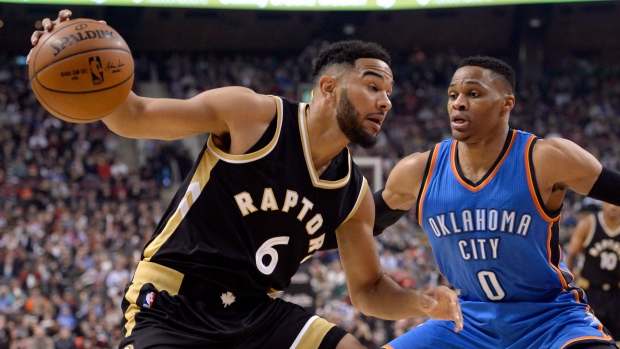
It's possible that with DeMar DeRozan's heroics, Wright's improvement and the new guys – Serge Ibaka and P.J. Tucker – doing their thing, Joseph's role in the team's recent success has gone somewhat overlooked, which is a shame.
In two seasons with the Raptors, Joseph has established himself as one of the league's premier backups at his position. In Lowry's absence, he more than held his own as a starter. No, he wasn't Lowry, but they weren't asking him to be. He was himself, and perhaps the best version of himself we've seen in his now six-year career. Logging 32 minutes per contest, Joseph averaged 11.2 points, 3.8 rebounds and 5.0 assists on 48 per cent shooting and was a team-best plus-71 in those 21 games.
Coming off an uncharacteristically inconsistent and disappointing start to the season, the promotion helped spark his second half resurgence. Now, even with Lowry back, Joseph's maintained his high level of play, something that should serve the team well going into the playoffs.
"His growth as a player the last two years has been incredible," Lowry said of his backup. "His confidence in his shot, his playmaking ability has just continued to grow and I think he'll continue to grow as a player and get more comfortable as a player the more minutes, the more time he gets on the floor."
In terms of the future, it's the same general principle as with Wright: that experience in an expanded role can only help the player grow, while increasing his league-wide value, which certainly isn't a bad thing for either party.
NORMAN POWELL
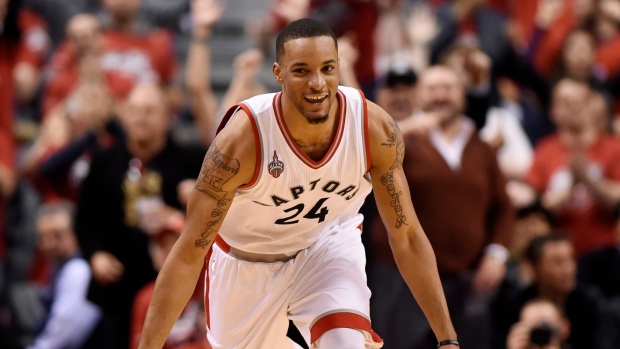
For a week, albeit one without any games, Powell finally seemed to have an undisputed, regular role in Casey's rotation. The trade of Terrence Ross freed up minutes for the talented sophomore before the subsequent deal for Tucker sent him right back into limbo, which is exactly where he finds himself now that the Raptors have a full roster and a tighter rotation going into the playoffs.
With Lowry out, Powell got to play, also serving as an offensive focal point in the second unit. Although the results were mixed, additional experience for good, young players can't hurt.
DEMAR DEROZAN
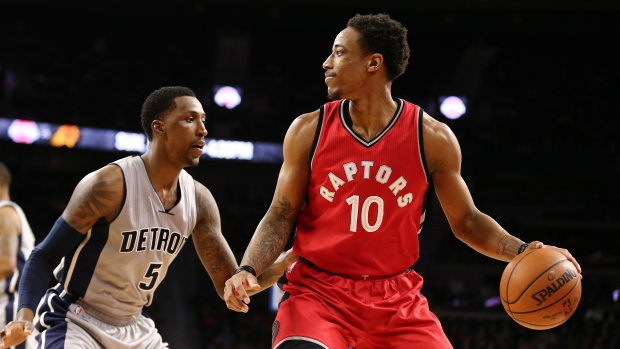
The ongoing evolution of DeRozan's game continues to amaze and we saw yet another layer to it these past few weeks. Already in the midst of a career season, the eight-year vet didn't miss a beat in the absence of his co-pilot.
Without Lowry on the floor to alleviate some of the defensive pressure, opposing teams keyed in on DeRozan like never before. The traps he normally faces came quicker. The tough shots he normally takes were tougher. Still, he scored roughly the same amount of points (27.1) in an equally efficient fashion (47 per cent), despite the much higher degree of difficulty.
To no surprise, the Raptors would struggle to score, particularly when their 3-pointers weren't falling and the ball wasn't moving, but DeRozan's offensive mastery often bailed them out. However, the most impressive thing about his play was his willingness and ability to adjust. He rarely seemed stymied by the defence, embracing double and triple coverage to make plays for his teammates. At times, he was Toronto's acting point guard on the floor.
"Every year DeMar just seems to grow and continue to get better," Lowry said. "I think two years ago he was getting to be a better passer and last year we needed him to score more. This year, we needed him to score early but then when I went out we needed him to pass so he just evolved into being able to make plays and score at the same time."
If you're looking for a residual effect to the Lowry injury that may have an immediate impact, this could be it. In the event that DeRozan's improved ability to quarterback and play through defensive pressure carries over to the playoffs – where he's had difficulty adjusting before – the Raptors become a far more dangerous and versatile offensive team.
KYLE LOWRY

Yes, even Lowry benefited from his forced time off, but good luck getting him to see it that way.
Lowry's a competitor, who only knows how to play hard and wants to be out there to do it as much as his body will physically allow. It's what makes him the player he's become, but it's also what scares the bejesus out of the people that are invested in his wellbeing. Say, his coaches, or the front office folks, or even the fans.
In an alternate universe, Lowry chooses not to have surgery, ends up leading the league in minutes and goes into the playoffs having carried a massive workload. Instead, he wisely took care of a nagging wrist ailment, one that had likely been bothering him to some degree for a while, one that would have probably continued to bother him. He'll go into the playoffs well rested, presumably without all the bumps and bruises he's had at this time in each of the last three years. Assuming good health in the playoffs, that's also how he'll go into free agency this summer.
The injury was unfortunate. It's not something you want for any player, let alone one that has worked so damn hard to get to where he is today. It robbed him of adding another great season to his resume, potentially his best ever and one that would have rivalled DeRozan's and anyone else's in franchise history. It robbed us of watching it unfold.
What we're doing here is not suggesting that the injury was a good thing, but that some good came out of a bad situation.

